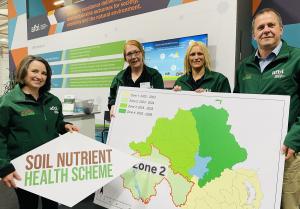Preparations are being made for the opening of Zone 2 of the Soil Nutrient Health Scheme, as activity in Zone 1 is coming to a conclusion. The next phase of the scheme will see free soil sampling made available to farmers in Co. Fermanagh, Co. Tyrone (south) and Co. Armagh (west).

The Scheme will open on 26th June 2023 in Zone 2 and provide farmers with vital, detailed information on managing soil nutrients and carbon on their farms. This will help them to optimize the application of crop nutrients, improve farm profitability while reducing the potential for nutrient loss to the environment.
Speaking at the launch of the release date at the Balmoral Show the Head of the Environment and Marine Sciences Division, Pieter-Jan Schön said: “We have been delighted with the rollout of this ambitious programme to date and the 94% take up of the scheme in Zone 1 which we hope to replicate across the other zones, and going ahead imminently in Zone 2”.
Farmers will be invited to register their fields through their Government Gateway account and following that they will be contacted by the soil sampling contractors, RPS Group, who will arrange for sampling, typically, between November and February. The samples are sent to NRM Laboratories for analysis and reports are sent to farmers within 4-6 weeks following sampling.
This free service will provide participating farmers with:
- Detailed information on the nutrient status of their soils
- Runoff risk maps for nutrient loss to waterbodies for each field sampled
- Estimates of carbon stored in their soils and as above ground biomass for each farm
- Training on the interpretation of soil nutrient reports and generation of farm nutrient plans (via the training provided by CAFRE).
Agri-Food and Bioscience Institute are the delivery agent for the scheme, their spokesperson commented “We are pleased to report that to date over 135,000 soil samples have been taken in Zone 1 have been reported on with 6000 farmers receiving soil reports. Farmers have been receiving their reports via post and email, and in addition they can access their farm results and nutrient-loss risk maps via the Map Viewer accessible through their Government Gateway accounts.
Farmers have also been availing of the CAFRE training provided to help understand the findings and recommendations which will assist in the development of Nutrient Management Planning. Aveen McMullan (CAFRE) outlines the training provided:
“The aim of the training is to help farmers understand and interpret the information contained within their soil analysis reports and explain the role of carbon on farms. This training will also provide a step-by-step guide on how to use the CAFRE Crop Nutrient Calculator to create a Nutrient Management Plan. Taking part in the SNHS Nutrient Management Plan training will enable farmers to fully utilise the information provided in their SNHS soil analysis report, maximise the nutrient potential of their soils and allow them to take a planned approach to nutrient applications to benefit their individual businesses and protect the environment”.
The scheme is funded and managed by the Department of Agriculture, Environment and Rural Affairs. Their spokesperson commented that the “SNHS is one of the most comprehensive regional soil nutrient sampling schemes to be undertaken anywhere in the world. It will enable Northern Ireland farmers to optimise crop nutrient applications, assess on-farm carbon stocks and build farm resilience. Importantly, participating in the SNHS will also be a requirement for farmers accessing some future agricultural support schemes like the Farm Sustainability Payment and Farming with Nature. We would encourage farmers to register early to take advance of this free opportunity.”
Notes to editors:
AFBI’s Vision is “Scientific excellence delivering impactful and sustainable outcomes for society, economy and the natural environment”.
AFBI’s Purpose is “To deliver trusted, independent research, statutory and surveillance science and expert advice that addresses local and global challenges, informs government policy and industry decision making, and underpins a sustainable agri-food industry and the natural and marine environments”.
AFBI’s core areas:
- Leading improvements in the agri-food industry.
- Protecting animal, plant and human health.
- Enhancing the natural and marine environment.
Latest news
- AFBI issues Nematodirus warning – Spring 2025 11 April 2025
- Managing Nature Based Risks to the UK Economy and Opportunities for Green Finance 08 April 2025
- AFBI Hillsborough host AERA committee 27 March 2025
- The Omics Days Conference 27 March 2025
